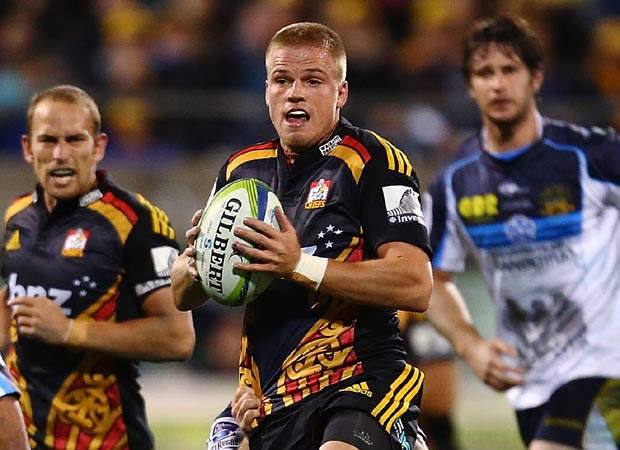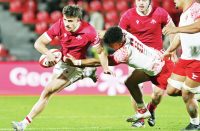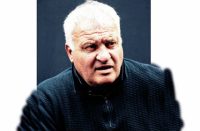 Buying a Kiwi for the sole purpose of wrapping him up in your national jersey alongside the natives can be more trouble than it’s worth. As Gareth Anscombe prepares to make the longest of long-distance transfers, choosing the Blues of Cardiff over rejoining those of Auckland, he will be anxious to avoid the fate which befell another New Zealander who took a similarly short cut into the Test arena two years ago.
Buying a Kiwi for the sole purpose of wrapping him up in your national jersey alongside the natives can be more trouble than it’s worth. As Gareth Anscombe prepares to make the longest of long-distance transfers, choosing the Blues of Cardiff over rejoining those of Auckland, he will be anxious to avoid the fate which befell another New Zealander who took a similarly short cut into the Test arena two years ago.
Michael Bent walked out of the arrivals’ hall at Dublin airport straight into the Ireland squad. Within a fortnight, he was playing his first match in Ireland for Ireland, as a substitute tighthead for the last ten minutes.
Indecent was hardly the word for the haste of his conversion. Ireland, horrified at their scrum disintegrating like so much balsa wood at Twickenham earlier in the year, were only too relieved to have discovered that the Taranaki prop’s ancestry entitled him to be rushed into the national team.
There was no time to permit the poor chap even the most cursory of initiation ceremonies at club or provincial level.
A fortnight after playing his first match in Ireland for Ireland, Bent had played his last, again as a late substitute for Mike Ross, this time against Australia.
An exit almost as speedy as his entry puts the Bent case in a league of its own, an example that even those who come highly recommended do not always live up to the ballyhoo.
The 26-year-old Hurricanes prop landed with a reputation for being able to play on both sides of the scrum. He had barely reunited one half of his family with the auld sod from where his maternal grandmother emigrated than the Irish management, then headed by Declan Kidney, was left to wonder whether he was up to the job.
Kidney’s successor, Joe Schmidt, will take some convincing. The IRFU having signed Bent on a central contract and farmed him out to Leinster, Schmidt parked the Kiwi on the bench throughout the champions’ defence of the European Cup.
The Hurricane had blown himself out to such an extent that when Leinster picked two complete front row units for their Pro 12 Grand Final against Glasgow in May, Bent failed to make the bench behind Mike Ross and Jack McGrath on one side of the scrum, Cian Healy and Martin Moore on the other.
Anscombe has to endure only 23 minutes for Wales to last longer in the red than Bent lasted in the green. Other New Zealanders have made even briefer appearances in different guises although neither had been afforded the security of a central contract.
Glasgow scrum-half Sam Pinder managed 14 minutes for Scotland, as Mike Blair’s replacement during successive Tests in South Africa in 2006. Mark van Gisbergen’s England career stretched to all of ten minutes against Australia at Twickenham in 2005 at the height of his productive years as Wasps’ goalkicking full-back.
Welsh supporters blessed with a sharply defined sense of right and wrong will be acutely sensitive to another fly half-cum-full back arriving from New Zealand and not entirely for moral reasons.
Shane Howarth came in the late Nineties, part of Graham Henry’s dodgy Kiwi collection which included a back-row forward by the name of Brett Sinkinson. Henry capped both on the general assumption that each had a Welsh grandparent and the IRB duly paid an embarrassingly heavy price for their gullibility in taking the Welsh Rugby Union at their word.
Neither had a Welsh grandparent and while Wales were light off lightly, the ‘Grannygate’ expose tarnished their reputation. Anscombe’s motives can, and have, been questioned, but his right to play for Wales cannot.
When it comes to ancestry, he is the Real McCoy with a Welsh mother but whether he proves worth the gold-plated lining of the parachute taking him across the world remains to be seen.
Whatever the cost, it will be less than £2m, the amount the WRU invested in Iestyn Harris, almost half of it on a transfer fee to Leeds Rugby League club. Within a fortnight of switching codes, in November 2001, Henry picked him at stand-off against Argentina.
Faced with the most demanding position of all, Harris, not surprisingly, failed to cope. “The game was something of a nightmare for me,” he said in retrospect. “I really didn’t know what I was doing.”
Anscombe may be a long way down the pecking order in New Zealand but at least he does know what he’s doing.
*This article was first published in The Rugby Paper on August 3.























